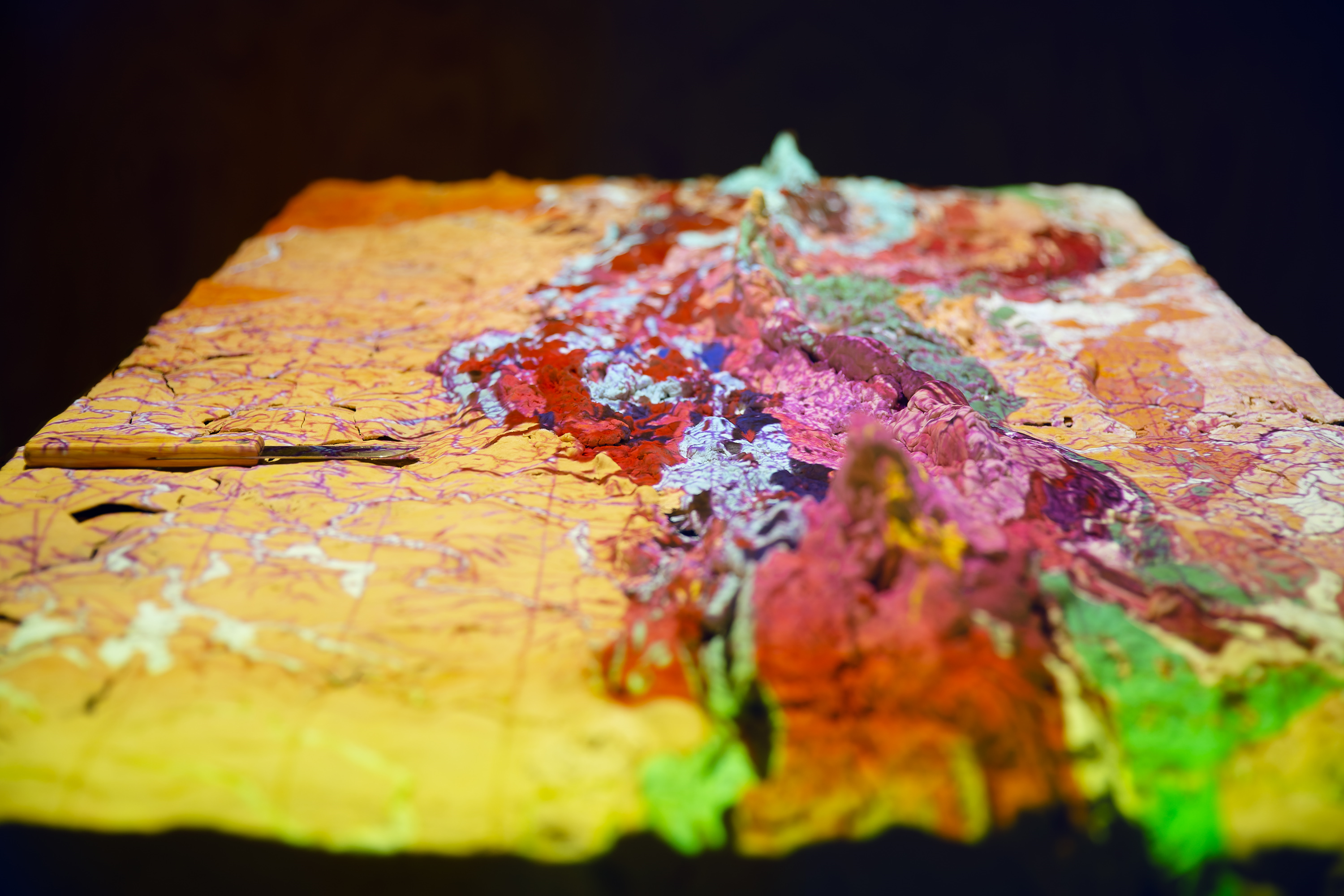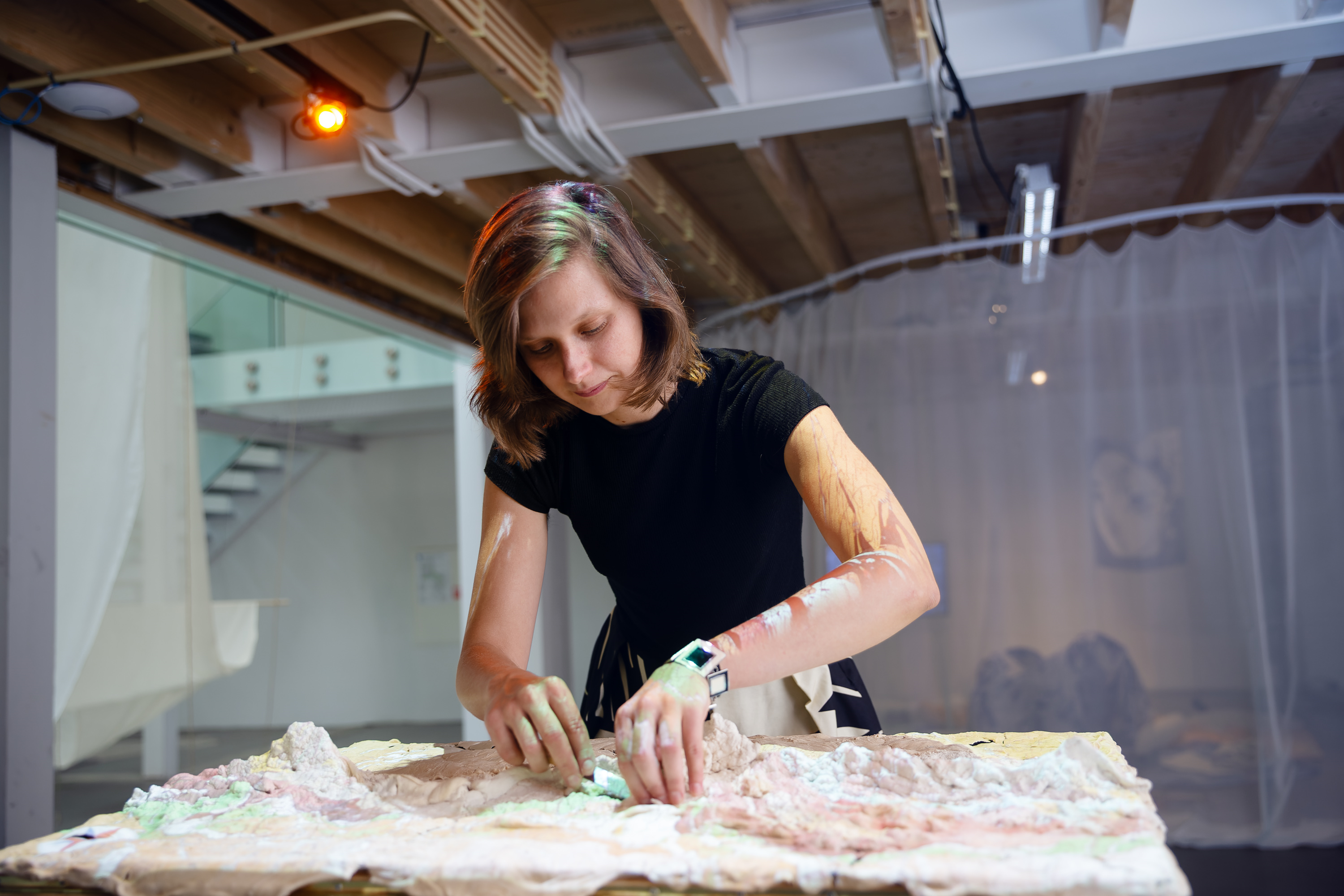Yet Vlada did not give up: her heritage and food culture literally became the dough she started kneading with – and made her graduate as a Master of Fine Art.
When she was twelve, Vlada moved from Russia to the United Kingdom, where her fascination for visual art was kindled by an intensely passionate teacher at her secondary school. Vlada spent all her free time at the arts department of her school. This teacher transformed her perspective on art and motivated her to start visiting exhibitions and galleries.
Housing crisis
After obtaining her Bachelor Fine Art at the Kingston School of Art in London, Vlada’s career took off. As a mixed media artist, she regularly participated in group exhibitions and performances. “I’ve always been fascinated by housing and by the housing crisis that is going on in many large Western cities such as London, so I integrated this theme into my art. When I moved from London to Rotterdam, I noticed that the housing shortage can be clearly sensed here as well. The issue seriously overwhelmed me and I realised: I’ll never solve this problem on my own. For me, it was more about the personal stories of the people living in these cities, these homes. Who are the people that are struggling; how do they live and feed themselves?’

EatHouse
During my residency and solo performance ‘SHOWROOM’ in Rotterdam, I discovered that stories about food and the culinary culture really interested me. And so, I wanted to explore how I could use food, along with ceramic, textiles, videos and natural paint, as a medium in my artworks. That’s when I founded, together with several other artists, the collective EatHouse. We explore the potential of food as a means to start up a dialogue about the ways in which the food culture can influence the social aspect. We organise events, kitchen take-overs, fund raising actions and online broadcasts. We also invite other artists who focus on food to share their research with a broader public.
Fertile grounds
As an artist, Vlada was always experimenting and meeting new people. Yet still, she missed the references, the mentors, and fertile grounds to firmly establish her artistry. ‘That’s why I enrolled at the HKU Master Fine Art. Others had told me good things about the course, and when I visited the HKU Loods, where the school is located, I felt this was exactly what I wanted.’
‘I was truly blown away when I discovered that the course leader is Annette Krauss, and that Falke Pisano is teaching at HKU, with Nancy Jouwe as an HKU fellow. These are all people whom I already admire, whose visions I share. My first thought was: these are the people I want to be taught by!’
Unforgettable
Vlada’s ambition was to go cooking with women from the Russian Ural region (where she comes from) and collect their stories. ‘But this was right at the time of the lockdown, so traveling there was impossible. When it finally seemed possible to go, Russia invaded Ukraine... I felt truly lost at that time. If I wouldn’t be right in the middle of the master’s programme, I would have abandoned this whole project. But by having lots of discussions, both with people from the course and outside, I managed to stick to my plan. Yet I also realised I had to choose a different approach. The war prevented me from gathering the stories, so it forced me to think about other options. In this phase, I truly felt I was carried by my teachers and tutors at HKU. They made me realise I had to hold on: this project was too important for me to quit. In hindsight, these might have been the most complicated two years of my life. But everyone involved in the master’s course supported me. I’ll never forget that.’

Mountainous landscape
Vlada eventually found several fellow Russians in the arts and cultural sector who were also living in the West, and who came from the same region as she. With these like-minded people, she discussed her project to further develop it. ‘These discussions were mainly about colonialism and imperialism, and the effect it still has on the lives we live now and here. In this way, I could still collect the stories that mattered. This research led to the artwork Take From the Table, Bring To The Table. It’s a foldable wooden table, with dough that is kneaded into the form of a mountainous landscape, on which the colourful map of the Ural Mountains is projected.’
Disruption
With Take From the Table, Bring To The Table, Vlada inspires her audience to look at ‘Pelmeni’ in a new light. Pelmeni is a type of dumpling, originating from the Altai Mountains, and spread across the broader Ural region by nomadic tribes. Her work further consists of two performative moments. In one lecture performance, Vlada addresses Russian imperialism in the Ural Mountains, by cutting up the landscape she created from her dough, to later serve and eat it together in the form of Pelmeni. The performance is a metaphorical criticism of how the nomadic cultures lose their resources and are disrupted as a consequence of imperialism. This is followed by a collective cooking session where visitors can have a talk together.
Ear bread
‘The collective cooking of Pelmeni (which literally translated to ‘ear bread’) is at the centre of the performance. Because cooking together creates times to listen to each other. Food actually contains history: when we eat a dish, we eat the cultural history of the food and the people who invented and perfected it. With every dish you eat, you also consume a story. And those stories must continue to be told, so that cultures and our cultural awareness are maintained.’